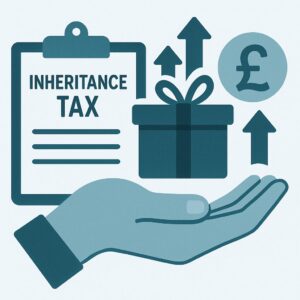Normal Expenditure Out of Income: An Overlooked Inheritance Tax Exemption
An often-overlooked exemption regarding Inheritance Tax is the normal expenditure out of income exemption. When used correctly, the relief allows individuals to make gifts during their lifetime that are immediately exempt from IHT, without waiting seven years.
For those who benefit from a surplus income, the exemption can mitigate the potential tax burden on an estate in a simple but effective way.
The exemption is found under section 21 of the Inheritance Tax Act 1984. In order to apply, three conditions must be met:
- The gift must be made as part of the normal expenditure of the donor;
- It must be made out of income and not capital; and
- The donor must retain sufficient means to maintain their usual standard of living.
Let’s break down each condition in turn.
Normal expenditure
In Bennett v IRC [1995] STC 54, the court described normal expenditure as a “settled pattern of expenditure adopted by the transferor.” That is, there must be some regularity or intention to continue.
Whilst one may think payments must be identical, what matters most is that there is a recognisable pattern or expectation of ongoing gifts. A good example of this would be regular payments towards university fees. Although these may fluctuate from term to term, the consistent pattern still satisfies this requirement.
There is no defined number of gifts or period over which they must be made. However, a time span of three to four years is considered a good indicator of a regular pattern of gifting, as per HMRC’s Inheritance Tax Manual at IHTM14242.
Out of income
To satisfy the second element, the gifts must be made out of income. Income can take the form of salary, pensions, dividends, interest, or rental income, essentially the net income an individual accumulates after paying taxes and expenses.
On the IHT403 form, HMRC considers an overview of the annual picture, comparing income against regular outgoings to determine whether gifts were genuinely made from surplus income.
Maintaining the donor’s lifestyle
The final condition is that the donor must maintain their normal standard of living after making the gifts. Gifting should not deprive them to the point of withdrawing capital in order to maintain day-to-day expenses. If the payments are so large that the donor relies on capital to cover ordinary outgoings, the exemption will not apply.
The test is therefore fairly simple: Can the donor maintain their usual lifestyle after making the gifts?
Practical examples
- A grandparent uses part of her pension to pay for her grandchildren’s private school fees each year.
- Parents cover annual life insurance premiums from employment income.
- Regular payments are made to support a child’s mortgage, funded entirely from investment or pension income.
All of the above examples can qualify if there is a clear pattern of gifting, the gifts are made from income, and the donor maintains the same standard of living.
Record keeping
You may satisfy all of the above conditions, but without clear evidence the exemption may fail. Executors are required to complete the IHT403, Schedule 2, setting out annual income, annual expenditure, and the surplus used for gifts.
Record keeping can save a great deal of time in probate and, where professional executors are appointed, can reduce costs. The best approach is to keep records during the donor’s lifetime, such as:
- A spreadsheet tracking annual income and expenditure;
- Bank statements or correspondence noting regular payments;
- Clear evidence of intention to make regular gifts, such as letters.
Points to note
- One-off gifts rarely qualify unless there is strong evidence of intention to continue (e.g written evidence from the donor to donee confirming that regular gifts are intended)
- The Nil Rate Band remains intact, save for any other gifts that are not out of income.
- Gifts should generally be comparable in size, although some variation is acceptable (e.g. university fees where income fluctuates).
Why it matters
For clients with high income, this is one of the most effective ways of reducing IHT exposure. Unlike potentially exempt transfers, there is no requirement to survive the gift by seven years; the exemption applies immediately, provided that the conditions are met.
For solicitors and advisors, knowledge and application of the exemption can be a valuable part of estate planning. Encouraging good record-keeping is just as important as identifying where the exemption applies.
Conclusion
The ‘normal expenditure out of income’ exemption is an underused but generous relief. With careful planning, a settled pattern of gifting, and accurate record keeping, it can deliver substantial IHT savings. To get in touch with Nicole to discuss the normal expenditure out of income exemption, use the contact details below.
Nicole Muchenje – Trainee Solicitor
Nicole.Muchenje@mogersdrewett.com

